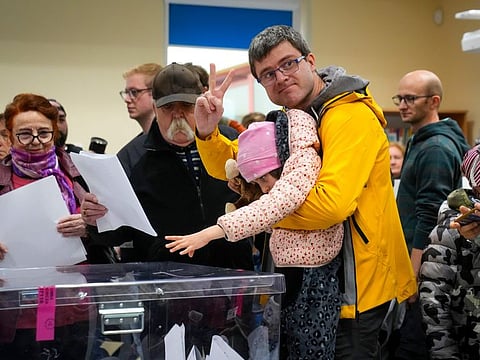Poles vote in a high-stakes election that will determine whether right-wing party stays in power
Many feel it’s most important election since 1989, when democracy was born after communis

WARSAW, Poland: Poland was choosing on Sunday between its ruling party and the coalition of opposition groups that accuse the conservative nationalists of eroding the country‘s 34-year-old democratic system.
Many Poles feel it is the most important election since 1989, when a new democracy was born after decades of communism.
At stake are the health of the nation’s constitutional order, abortion, and the foreign alliances of a country that has been a crucial ally to Ukraine.
Supporters of the ruling Law and Justice party say they appreciate its defence of Catholic traditions and its spending on retirees and families with children in this Central European nation of 38 million.
Law and Justice has also eroded checks and balances to gain more control over state institutions, including the courts, public media and the electoral process itself.
Support for the party has shrunk since the last election in 2019 amid high inflation, allegations of cronyism and bickering with European allies. Law and Justice won nearly 44% of the vote in 2019 but has been polling in recent weeks at over 30%. While still the single most popular party, Law and Justice was still at risk of losing its majority in parliament on Sunday.
The opposition parties Civic Coalition, Third Way and New Left have campaigned on promises to repair the rule of law and ties with the EU and other allies if they manage to gain power. The final outcome of the vote could be ultimately decided by the margins gained or lost by the smaller parties.
Factfile
Some 29 million Poles aged 18 and above are eligible to vote. They will choose 460 members of the lower house, or Sejm, and 100 for the Senate for four-year terms. More than 31,000 voting stations across Poland closed at 9 pm (0500-1900 GMT) on Sunday. Over 400 voting stations will operate abroad. Individual parties need to get at least 5% of votes to win seats in parliament, coalitions need at least 8% of votes. The State Electoral Commission may take two, even three, days to announce full official results of the elections. Opinion polls suggest the ruling Law and Justice party will win the most votes, but not enough for a majority in Parliament. THE REFERENDUM A referendum with four questions is being held in parallel with the parliamentary vote. Voters are being asked their views on whether to accept migrants, keep a new wall on the border with Belarus, raise the retirement age and sell off state assets. More than 50% of eligible voters need to take part to make the referendum legally binding. Some opposition groups are calling on voters to boycott it.
Law and Justice could need the support of the far-right Confederation party to govern, but both parties said during their campaigns that that is not an option.
Civic Coalition leader Donald Tusk, the former prime minister, was cheered by a large crowd when he voted in Warsaw, with people snapping photos and wishing him good luck. The Law and Justice leader, Jaroslaw Kaczynski, also voted in Warsaw.
Tomasz Druzynski, an information technology specialist, voted in Warsaw and said he believes that change is possible.
“I believe in it and I think this is the first chance in eight years to change something. And I hope this change will come,” Druzynski said.
The continued growth of Poland’s dynamic economy was also on voters’ minds.
Jan Molak, an 80-year-old supporter of the ruling party, credited it with creating a more just economic system and the development boom of recent years.
“Things are getting better and better,” he said after voting in Warsaw.
Others see economic threats in the way the party has governed and believe that high social spending has helped to fuel inflation.
There is also a high level of state ownership in the Polish economy, and the ruling party has built up a system of patronage, handing out thousands of jobs and contracts to its loyalists.
The EU, whose funding has driven much of the economic transformation, is also withholding billions of euros (dollars) in funding to Poland over what it views as democratic erosion.
Political experts say the election will not be fully fair after eight years of governance by Law and Justice.
Retired nurse Barbara Burs voted early in Warsaw, saying she cast her vote to change the government because she wants a better country for her children and grandchildren — a “just and undivided Poland.”
The fate of Poland’s relationship with Ukraine is also at stake. The Confederation party campaigned on an anti-Ukraine message, accusing the country of lacking gratitude to Poland for its help in the war.
Sign up for the Daily Briefing
Get the latest news and updates straight to your inbox



